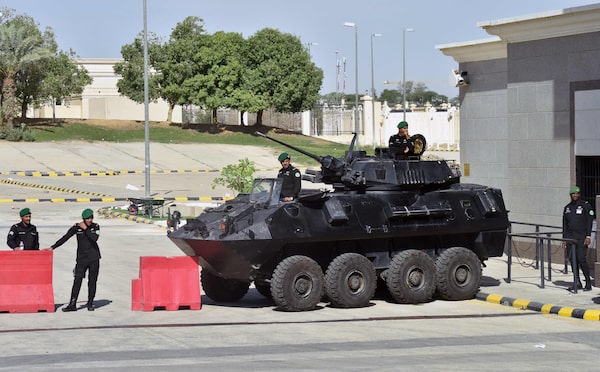
Saudi soldiers in armoured vehicles guard the entrance to the Diriya Palace in the Saudi capital Riyadh during the Gulf Cooperation Council (GCC) summit on Dec. 9, 2018. Saudi Arabia received more than $1.15-billion in defence equipment shipments from Canada in 2022, Department of Global Affairs says.FAYEZ NURELDINE/AFP/Getty Images
Saudi Arabia, which last month reconciled with Canada after a diplomatic rupture over human-rights activists lasting nearly five years, remains this country’s most important customer for Canadian-made military goods after the United States, according to a new report.
Ottawa’s Department of Global Affairs in a May 31 report said Saudi Arabia was again the top non-U.S. export market for defence equipment in 2022, receiving more than $1.15-billion in shipments from Canada.
The kingdom represents a key portion of Canada’s foreign customer base for security gear; in 2022, it comprised about 54 per cent of the value of total military exports from Canada to non-U.S. destinations, the report said.
The next highest Canadian arms customer by value of exports in 2022 was Germany, at more than $221-million.
Global Affairs does not publish the full value of annual military exports to the United States but arms trade monitor Project Ploughshares, based in Waterloo, Ont., estimates it significantly exceeds $1-billion.
Almost all of Canada’s annual arms shipments in 2022 to Saudi Arabia, or 92 per cent, were armoured combat vehicles. Most are part of a $15-billion contract brokered by the Harper government in 2014 but approved for export by Justin Trudeau’s government. Most, if not all, of these light-armoured vehicles (LAVs) are equipped with machine guns or anti-tank cannons.
Last year was the 11th year in a row where Saudi Arabia, which is ranked among the worst countries in the world for human rights by Freedom House, has been Canada’s second-biggest customer of military goods. Freedom House, an American advocacy group for civil liberties, awarded the kingdom a score of 8/100 on its latest global freedom scoring. (Canada, by comparison, gets a 98/100 score.)
Kelsey Gallagher, a researcher at Project Ploughshares, noted the half-decade diplomatic quarrel between Ottawa and Riyadh had no apparent material influence on the value of military exports to Saudi Arabia over the years. He pointed out that these shipments hit new highs over that period.
Even the murder of dissident Saudi journalist Jamal Khashoggi and mounting international condemnation for the costly war Riyadh has been waging in neighbouring Yemen had no impact. In 2019, a UN report said there is credible evidence Crown Prince Mohammed bin Salman and other high-level officials are liable for Mr. Khashoggi’s death at the kingdom’s Istanbul consulate.
Back in August, 2018, Saudi Arabia expelled Canada’s ambassador after Global Affairs and Chrystia Freeland, who was minister of foreign affairs at the time, used Twitter to call for the immediate release of several imprisoned political activists in the kingdom. Riyadh also recalled its envoy, decrying what it called “blatant interference” in its internal affairs, and froze new trade and investment with Canada.
Canada and Saudi Arabia announced on May 24 of this year, however, that they were restoring full diplomatic relations “on the basis of mutual respect and common interests.”
There are no signs that Saudi Arabia has improved its human-rights record in the interim. “Saudi Arabia’s absolute monarchy restricts almost all political rights and civil liberties,” Freedom House says in its latest report on Saudi Arabia.
“No officials at the national level are elected,” the report says. “The regime relies on pervasive surveillance, the criminalization of dissent, appeals to sectarianism and ethnicity, and public spending supported by oil revenues to maintain power. Women and members of religious minority groups face extensive discrimination in law and in practice.”
In August, 2022, Freedom House noted, “two Saudi women received draconian prison sentences for allegedly criticizing the government via social media. Salma al-Shehab was sentenced to 34 years in prison for following and sharing the posts of activists and dissidents on Twitter, and for being in possession of a banned book. Noura al-Qahtani was sentenced to 45 years in prison for using social media to allegedly ‘spread lies,’ among other purported crimes.”
Dennis Horak, Canada’s previous ambassador to Saudi Arabia, who was expelled in 2018 when relations fell apart, said Riyadh has been working to repair ties with a number of countries recently, noting this spring that Saudi Arabia agreed to restore diplomatic relations with both Iran and Syria. Syrian President Bashar al-Assad, accused of war crimes by a UN inquiry, has long been shunned for his crackdown on protests and a brutal civil war at home.
“As one Saudi friend said, to me: ‘Once you’ve re-embraced Assad, a tweet seems pretty pale in comparison to hold a grudge over.’ ” Mr. Horak said, referring to the 2018 tweets from Canada that drew Riyadh’s ire.
The 2014 light-armoured-vehicle (LAV) contract between General Dynamics Land Systems-Canada and the Saudi monarchy was slated to run as many as 14 years – which means it’s near the end of its term. The deal fuelled major controversy for both the Harper and Trudeau governments in part because such agreements are brokered by a Canadian Crown corporation.
Mr. Horak doesn’t think that the Canadian government under Mr. Trudeau would consider signing another armoured-vehicle deal with the Saudis.
“Normalizing diplomatic relations is one thing but getting into another LAV deal with the Liberal government? I would be very surprised if that were to happen. I wouldn’t rule it out completely but I’d be surprised,” Mr. Horak said.
Doug Wilson-Hodge, director of strategy and business development for General Dynamics Land Systems-Canada, based in London, Ont., declined to comment when asked whether the company is hoping to strike a new contract with Saudi Arabia to sell Riyadh more armoured vehicles.